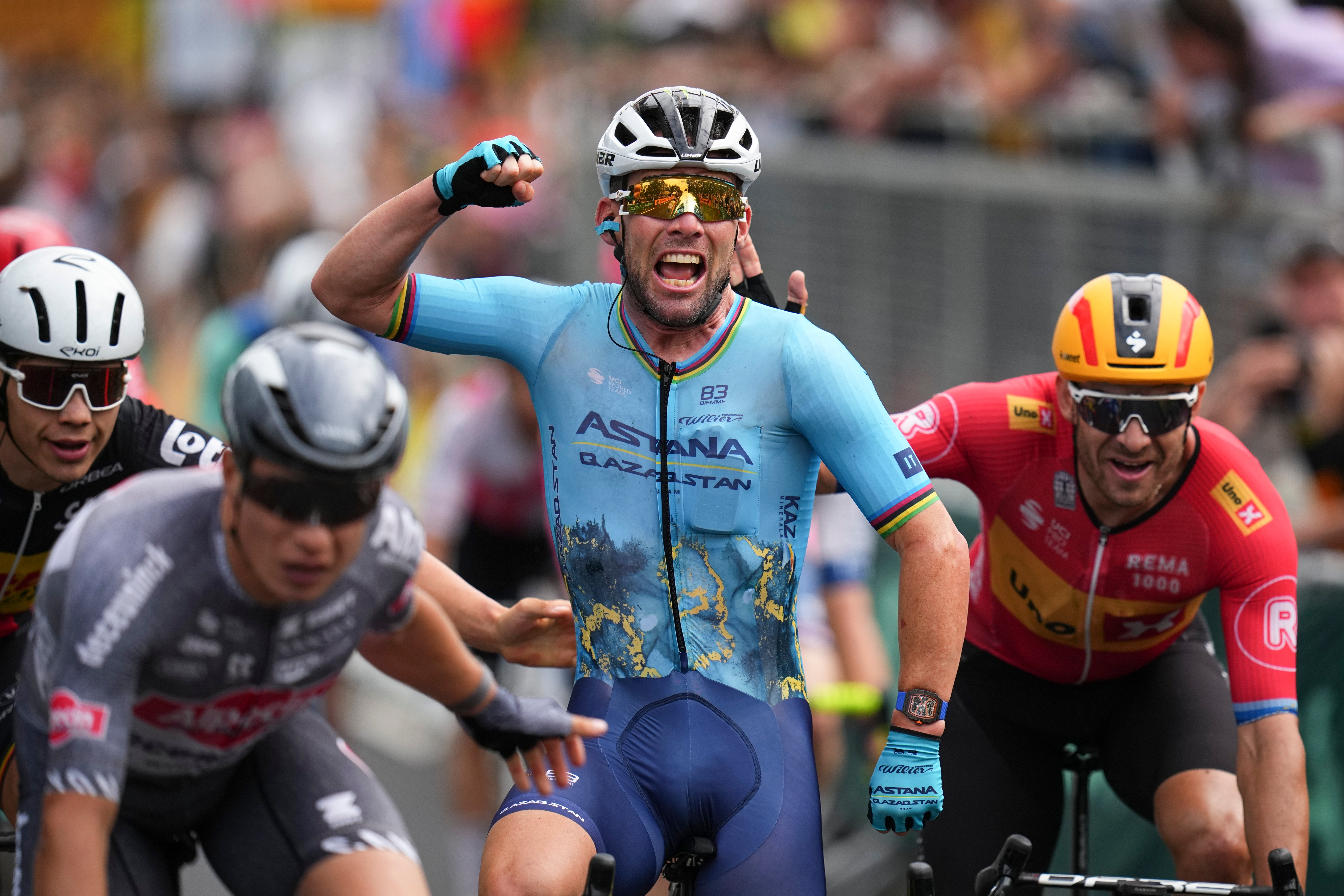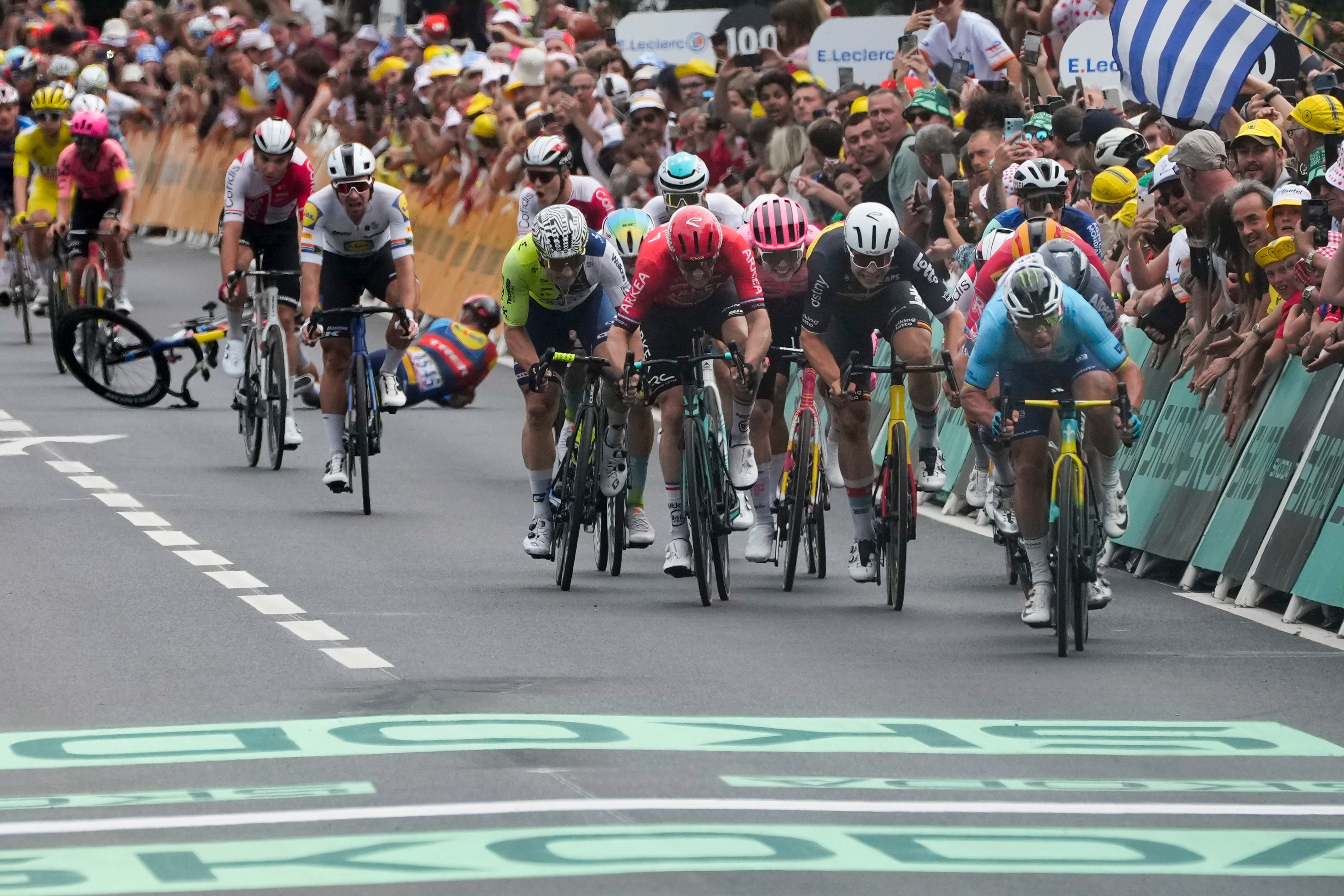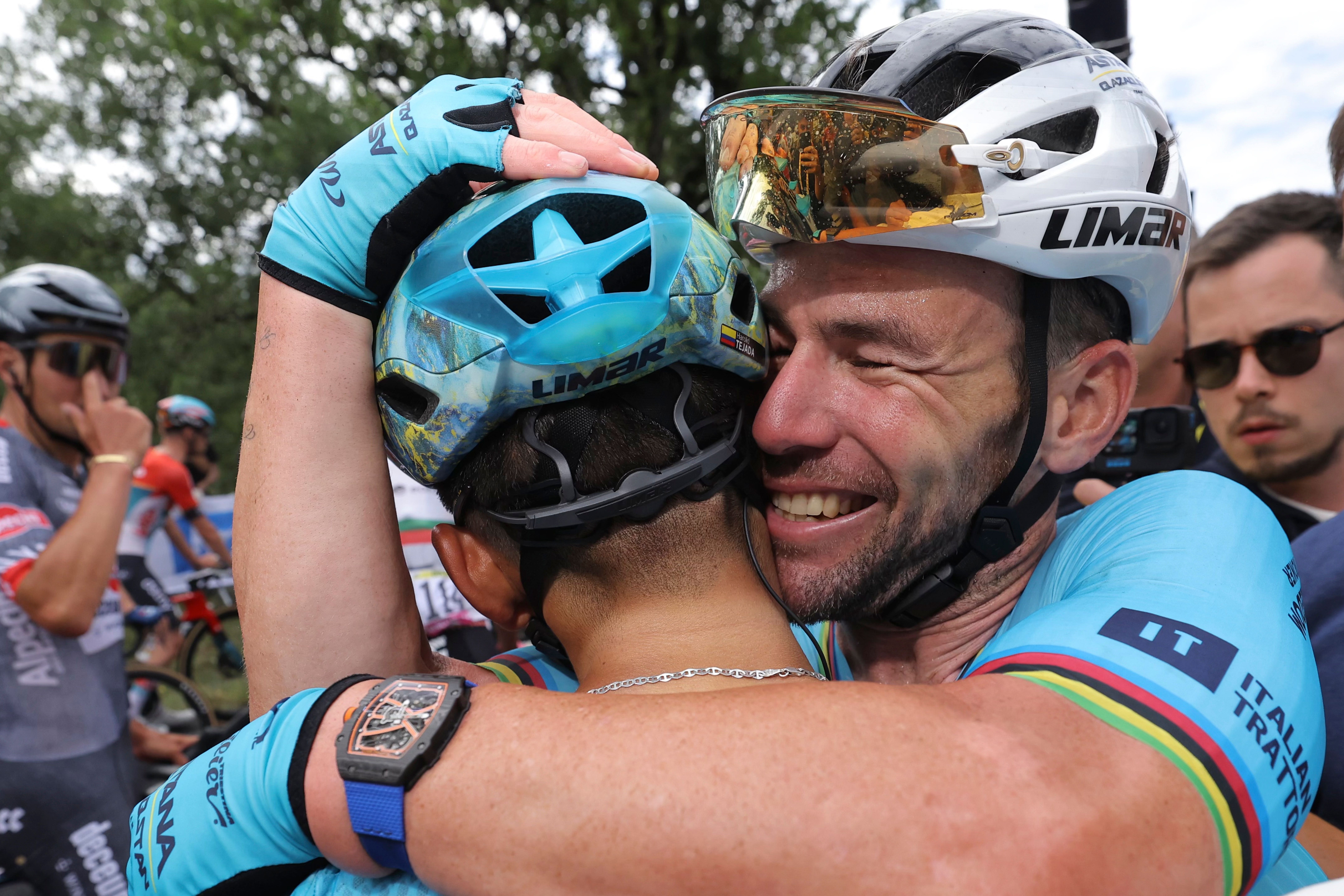How Mark Cavendish out-thought his rivals to win a record 35th Tour de France stage
Cavendish may not be the fastest rider in the peloton but his determination to hog the best position on the road and his intelligence to surf rivals’ wheels to victory on stage five was a masterclass in sprinting

Your support helps us to tell the story
From reproductive rights to climate change to Big Tech, The Independent is on the ground when the story is developing. Whether it's investigating the financials of Elon Musk's pro-Trump PAC or producing our latest documentary, 'The A Word', which shines a light on the American women fighting for reproductive rights, we know how important it is to parse out the facts from the messaging.
At such a critical moment in US history, we need reporters on the ground. Your donation allows us to keep sending journalists to speak to both sides of the story.
The Independent is trusted by Americans across the entire political spectrum. And unlike many other quality news outlets, we choose not to lock Americans out of our reporting and analysis with paywalls. We believe quality journalism should be available to everyone, paid for by those who can afford it.
Your support makes all the difference.In hindsight, the moment we should have known Mark Cavendish would win a 35th Tour de France stage was not as he screamed down the home straight, mouth agape, furiously pedalling away from his rivals. It was two days earlier as he suffered in the Italian hills, when he shouted at a camera operator poking their equipment in his personal space. Angry Cavendish is here? Oh, this might just be his year.
He has always turned frustration into a fuel source, an energy harnessed to raise the standards of everyone around him. As his long-time leadout man Mark Renshaw told The Independent last year: “We stood on the bus after races and screamed at each other … But he walks into a room and everybody lifts because everybody wants to be better.”
And yet Cavendish has the calmest head in a storm. Sprinting is a ludicrous endeavour, riding hip to hip at 50mph when the chances of crashing are high, and the injuries when you do are often race-ending. Sometimes they are life-threatening. For most of us it is impossible to fathom what it’s like to be in the middle of a bunch sprint with 300m to go, caught in the eye of a typhoon raging towards the finish line, knowing there is a path out somewhere and you have to find it. Knowing one false move ends your hopes, or worse.
Often through the peak of his career, Cavendish was presented at the finish of a Tour de France stage by Renshaw or later Michael Morkov, world-class lead-out riders who played the role of satnav, windshield and bodyguard all at once. They would be the last driver on a train of teammates designed to control as many details of the chaotic finish as they feasibly could. But by the finish on Wednesday, Cavendish was all alone.
“We didn’t nail it as a team like we wanted to do,” he explained. “But the boys improvised and got me there in the best position, and I shot on to whatever train was going.”
The finale showcased the very best of Cavendish, a vignette of what makes him the greatest to ever do it. Sprinters can seem superhuman at times but they cannot ride through metal barriers, or through the rider in front of them: sprinting is about space and timing, about positioning as the blurry shapes around you move. It is a game of Tetris ratcheting up beyond the speed of thought, and the greatest sprinters can feel their way through it.

Watch it back and you can see the path he charts and the battles he fights to get there. With 500m to go, Cavendish is on the tail of Jasper Philipsen, the favourite who dominated last year’s Tour. He notices Phil Bauhaus trying to take his prime spot and barges the German out of the way. They bounce off one another and when he recovers, Fernando Gaviria is now trying to steal the position. Again, Cavendish holds out an elbow and Gaviria is forced to give up as the gap narrows.
After the jostling comes the strategy. Cavendish realises Philipsen is stuck in a tight spot and he doesn’t delay, jumping on to the wheel of Pascal Ackermann. It is a clever move: Ackermann drags him to the front, ahead of Philipsen, who loses momentum squeezed against the barriers on the final bend.
As they approach the finish Cavendish breaks cover, veering into clear air on the opposite side of the road before gunning to the line. He had sniffed out the route no one else could. “It’s definitely a benefit, especially when you’re not physically as good as everybody else,” he said of his tactical game. “It’s definitely beneficial to be able to use your head.”
Cavendish has always been blessed with raw speed, and that power is still loaded in his legs – he showed it similarly to win the final stage of last year’s Giro d’Italia. But as he has got older, his brain has become an even more important tool. He once had the best team on the road built around him and he could afford to make small mistakes. Now he is no longer the fastest in the peloton and perhaps wouldn’t finish in the top 10 in a drag race.
The preparation had to be perfect. His Astana team may not have the strength of Philipsen’s Alpecin–Deceuninck, but they set their entire year around the final kilometre of stage five of this Tour de France. “We worked on exactly what we wanted to do,” Cavendish said. “How we built the team, what we’ve done with the equipment, every little detail has been put together specifically for today.”
He has always been meticulous, poring over the road book the night before a sprint stage, scrolling through Google street view, visualising every bump in the road. But in the end it required thinking on his feet, surfing the wheels of riders quicker than him. “It’s how the Tour de France is,” he said. “You sprint as hard as you can until you get to the finish line. And maybe your life changes.”

None of this should be possible. He is 39, the second oldest winner of a Tour de France stage in its 121 years. Put in his shoes, most would have retired long ago, perhaps around the time he had Epstein-Barr virus so severely he could barely walk up the stairs without stopping for breath, or when he crashed out of last year’s race with a broken collarbone.
But Cavendish is wired differently. Sitting in the hospital bed, he decided: not that this was a sign he was no longer cut out for the Tour de France, but that he had unfinished business on the road. He resolved to get better and get faster.
Even on the weekend, when he was suffering from heat stroke on stage one, he didn’t stop believing. “I’ve done 15 Tour de Frances now,” he said. “I don’t like to have bad days, I don’t like to suffer, but I know it’s just in the head, and you push, you get through it.”
Given what Cavendish has finally achieved, this will surely be his last Tour. There are perhaps four more chances along this year’s route to win. His tally of 35 may never be beaten, but he could yet make his record even harder to reach. “Don’t beat it,” Cavendish joked to Tadej Pogacar after the stage, with a hint of warm menace. Pogacar has 12 Tour stages, aged 25: he probably won’t beat it, and perhaps no one ever will.
Cavendish has completed his mission, his destiny fulfilled. And he is not quite done yet.
Join our commenting forum
Join thought-provoking conversations, follow other Independent readers and see their replies
Comments